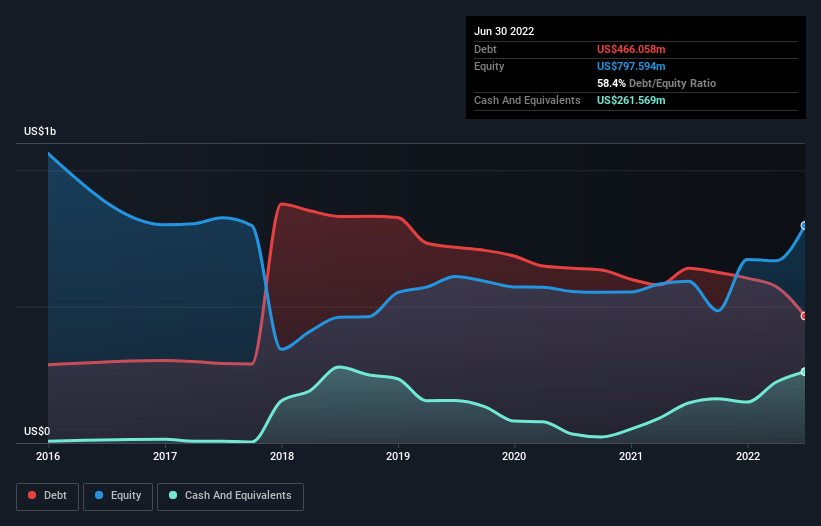
Legendary fund manager Li Lu (who Charlie Munger backed) once said, 'The biggest investment risk is not the volatility of prices, but whether you will suffer a permanent loss of capital.' So it seems the smart money knows that debt - which is usually involved in bankruptcies - is a very important factor, when you assess how risky a company is. As with many other companies CONSOL Energy Inc. (NYSE:CEIX) makes use of debt. But is this debt a concern to shareholders?
What Risk Does Debt Bring?
Debt assists a business until the business has trouble paying it off, either with new capital or with free cash flow. Ultimately, if the company can't fulfill its legal obligations to repay debt, shareholders could walk away with nothing. However, a more frequent (but still costly) occurrence is where a company must issue shares at bargain-basement prices, permanently diluting shareholders, just to shore up its balance sheet. Of course, debt can be an important tool in businesses, particularly capital heavy businesses. The first thing to do when considering how much debt a business uses is to look at its cash and debt together.
View our latest analysis for CONSOL Energy
What Is CONSOL Energy's Net Debt?
You can click the graphic below for the historical numbers, but it shows that CONSOL Energy had US$466.1m of debt in June 2022, down from US$640.7m, one year before. However, because it has a cash reserve of US$261.6m, its net debt is less, at about US$204.5m.

How Healthy Is CONSOL Energy's Balance Sheet?
According to the last reported balance sheet, CONSOL Energy had liabilities of US$576.5m due within 12 months, and liabilities of US$1.35b due beyond 12 months. Offsetting these obligations, it had cash of US$261.6m as well as receivables valued at US$149.3m due within 12 months. So it has liabilities totalling US$1.51b more than its cash and near-term receivables, combined.
This deficit is considerable relative to its market capitalization of US$2.05b, so it does suggest shareholders should keep an eye on CONSOL Energy's use of debt. This suggests shareholders would be heavily diluted if the company needed to shore up its balance sheet in a hurry.
We use two main ratios to inform us about debt levels relative to earnings. The first is net debt divided by earnings before interest, tax, depreciation, and amortization (EBITDA), while the second is how many times its earnings before interest and tax (EBIT) covers its interest expense (or its interest cover, for short). The advantage of this approach is that we take into account both the absolute quantum of debt (with net debt to EBITDA) and the actual interest expenses associated with that debt (with its interest cover ratio).
While CONSOL Energy's low debt to EBITDA ratio of 0.51 suggests only modest use of debt, the fact that EBIT only covered the interest expense by 3.1 times last year does give us pause. So we'd recommend keeping a close eye on the impact financing costs are having on the business. Notably, CONSOL Energy's EBIT launched higher than Elon Musk, gaining a whopping 268% on last year. When analysing debt levels, the balance sheet is the obvious place to start. But it is future earnings, more than anything, that will determine CONSOL Energy's ability to maintain a healthy balance sheet going forward. So if you're focused on the future you can check out this free report showing analyst profit forecasts.
Finally, a business needs free cash flow to pay off debt; accounting profits just don't cut it. So the logical step is to look at the proportion of that EBIT that is matched by actual free cash flow. Happily for any shareholders, CONSOL Energy actually produced more free cash flow than EBIT over the last two years. That sort of strong cash conversion gets us as excited as the crowd when the beat drops at a Daft Punk concert.
Our View
Happily, CONSOL Energy's impressive conversion of EBIT to free cash flow implies it has the upper hand on its debt. But we must concede we find its interest cover has the opposite effect. All these things considered, it appears that CONSOL Energy can comfortably handle its current debt levels. Of course, while this leverage can enhance returns on equity, it does bring more risk, so it's worth keeping an eye on this one. There's no doubt that we learn most about debt from the balance sheet. However, not all investment risk resides within the balance sheet - far from it. These risks can be hard to spot. Every company has them, and we've spotted 2 warning signs for CONSOL Energy you should know about.
If you're interested in investing in businesses that can grow profits without the burden of debt, then check out this free list of growing businesses that have net cash on the balance sheet.
New: AI Stock Screener & Alerts
Our new AI Stock Screener scans the market every day to uncover opportunities.
• Dividend Powerhouses (3%+ Yield)
• Undervalued Small Caps with Insider Buying
• High growth Tech and AI Companies
Or build your own from over 50 metrics.
Have feedback on this article? Concerned about the content? Get in touch with us directly. Alternatively, email editorial-team (at) simplywallst.com.
This article by Simply Wall St is general in nature. We provide commentary based on historical data and analyst forecasts only using an unbiased methodology and our articles are not intended to be financial advice. It does not constitute a recommendation to buy or sell any stock, and does not take account of your objectives, or your financial situation. We aim to bring you long-term focused analysis driven by fundamental data. Note that our analysis may not factor in the latest price-sensitive company announcements or qualitative material. Simply Wall St has no position in any stocks mentioned.
About NYSE:CNR
Core Natural Resources
Produces and sells bituminous coal in the United States and internationally.
Undervalued with high growth potential.
Similar Companies
Market Insights
Community Narratives



